UK maritime sector and shipbuilding industry representatives have urged the government to act on eight recommendations designed to advance the National Shipbuilding Strategy Refresh launched in 2023.
The recommendations were laid out in a press release by Maritime UK.
The National Shipbuilding Strategy Refresh is a 30-year vision focusing on developing a productive, competitive, and innovative shipbuilding industry in the UK. The strategy, launched in March 2022, included a promise to support green shipbuilding technologies, strengthen the UK’s skill base, and develop a Home Shipbuilding Credit Guarantee.
The recommendations have been devised following a joint meeting of the Scottish Parliament’s Cross-Party Group (CPG) on Maritime and Shipbuilding, and the UK Parliament’s All-Party Parliamentary Group (APPG) on Shipbuilding and Ship Repair. The proposed changes aim to maximise opportunities for the UK shipbuilding enterprise, increase UK content in new builds, and bolster investment for innovation, research, and development.
Paul Sweeney MSP, convener of the CPG on Maritime and Shipbuilding, warned that the UK has a “critical five-year window of opportunity” to re-establish commercial shipbuilding at scale, but this opportunity might be lost if the government fails to act urgently. He pointed out that orders from the 30 Year Cross-Government Shipbuilding Pipeline have already been lost to Spanish and Turkish shipyards.
Both Sweeney and Kevan Jones MP, chair of the APPG on Shipbuilding and Ship Repair, stressed the importance of government action on the eight recommendations. They urged government ministers to ensure clarity and certainty for the industry, particularly regarding finance, demand signals, and skills.
Chris Shirling-Rooke MBE, CEO of Maritime UK, emphasised the importance of maintaining the momentum initiated by the National Shipbuilding Strategy. He added that Maritime UK members remain “committed to working with the National Shipbuilding Office towards realising the vision of the UK as a global shipbuilding hub.”
Full recommendations:
- The NSO should continue to work with HM Treasury and Government departments to ensure that the delivery of vessels within the cross-government pipeline maximises the opportunities for the UK shipbuilding enterprise, enabling it to deliver a range of economic benefits across the country.
- The Government should give further consideration to public sector shipbuilding procurement policies, recognising the strategic importance of the UK shipbuilding enterprise and better evaluating its contribution to UK prosperity.
- Despite welcoming the minimum 10% social value weighting, the UK shipbuilding enterprise invites the Government to show ambition and raise the threshold for UK content.
- The Government should devote even greater levels of investment in innovation, research and development, and green infrastructure and incentivisation in order to strengthen the maritime supply chain and the UK’s shipbuilding enterprise’s place within it.
- The Government should work with stakeholders across departments to take forward the recommendations outlined in Maritime UK’s Offshore Wind Plan, collaborating with the offshore renewable energy sector and the wider catapult network to further strengthen the UK’s maritime sector.
- The Government should address the competitiveness gap in providing capital to fund decarbonisation projects within the UK’s shipbuilding enterprise by implementing the recommendations of the UK Marine Decarbonisation Report – endorsed by the MCA and the Financial Products Working Group – into the Clean Maritime Plan Refresh.
- The Government should commit to a clear timeline for the implementation of the Home Shipbuilding Credit Guarantee Scheme (HSCGS) and stick to it.
- The Department for Education and the NSO should publish the Government’s response to the final report of the UK Shipbuilding Skills Taskforce before the end of 2023.
The full briefing can be viewed online here.
The National Shipbuilding Office and the Department for Education have been requested to publish the government’s response to the final report of the UK Shipbuilding Skills Taskforce before the end of 2023. The response is eagerly awaited by the sector, as the decisions made will greatly influence the future of the UK’s shipbuilding industry.



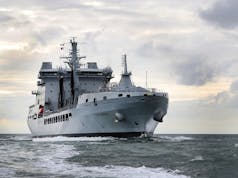
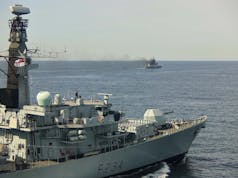

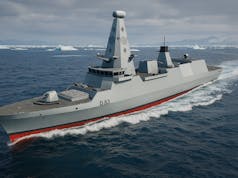

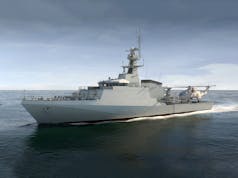

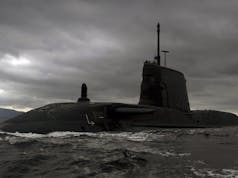
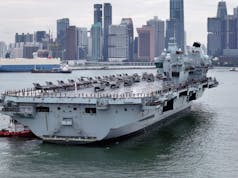
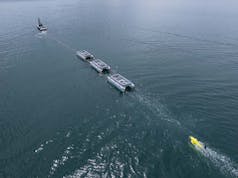

I’m i correct in assuming that a lot of the downturn in the UKs military manufacturing capability took place with the last labour government and its ethical stance regards arms sales .
The irony here is whilst the Labour party took the moral high ground there, they had no problem selling a military grade radar to Tanzania for use at the main airport. (Especially when it was revealed that a third of the monies involved ended up in private bank accounts)
Pertinent to the subject at hand: (note this will self delete in 24 hours)
https://i.postimg.cc/90N9YnyT/img360.jpg
Lord West huh ? Don’t remember him making that speech when he was in charge .
West…
Worst thing to ever happen to the RN in a long, long time.
He recommended cuts and oversaw them for the FF/DD, MCM and Sub fleet.
His Quote July 2004 “We must continue the shift in emphasis away from measuring strength in terms of hull numbers and towards the delivery of military effects… I am confident that these changes will leave the Navy better organised and equipped to face the challenges of the future.”
Yeah, we would be in a much better place today if West had kept a fleet of 30+ under armed frigates and destroyers with zero land attack capability or theatre control capability and a couple of light aircraft carriers able to operate a handful of third generation sub sonic aircraft. China and Russia would be truly s**ting their pants in the face if that force.
Who needs large combat vessels with land attack missiles or super carriers armed with the latest 5th generation aircraft.
Dam you lord west and Gordon Brown.
And also, lets not forget, that almost all of that fleet would, by now, have fallen apart through sheer old age?
Whilst G Brown Esq did throttle RN of new shipbuilding until the end of his reign he then very suddenly, post T45 agreed to QEC and to be totally fair to G Brown he did agree with West to use the remaining budget for T45 7 (there wasn’t enough money for 7 & 8) to expedite what became T26.
The problem was that T45 7 being deleted wasn’t met with an unbreakable contract as with QEC and was therefore subject to the vagaries of G Osbourne Esq and his massive and unthinking axe.
Which lead to the rerun of the T23 arguments of J Nott Esq who thought that ships should be cheap and preferably cheaper with no real armament coupled with the design life of a Sardine Tin.
Essentially the Sardine Tin problem and the Osbourne Axe / can down the road approach have exploded into a massive cost issue for the T23 fleet sustainment.
That is before you get into the silliness of selling of hulls 14-16 of T23 to avoid a refurb but keeping other elements of the fleet going that were life expired or getting rid of Fort Vic’s sister.
A lot of very silly short term cash saving that has cost huge amounts of money to deal with down the road.
But things to get better with T45 + PiP + Sea Ceptor + BMD, QEC, Tides, T26 and T31+ Mk 41 VLS +NSM at least ordered.
For all his many faults, without GB there’d be no QE class carriers.
If you look back the rot set in with John Nott in 1981. Although the three invincibles were retained after the Falklands this only stopped the rundown for a short time. Once Thatcher had her big win in 1983 the decline just kept going, she was as sea blind as everyone else and knew the cost of everything and the value of nothing. At the start of the conflict in 1982 she famously asked Admiral Leach “where is the Ark Royal?” and was startled to learn that it had been scrapped three years before, and while leader of the opposition at that time, she had done nothing to prevent it. I also believe that one of her cabinet ministers coined the expression “there are no votes in defence” which rather coloured their thinking.
We are in a pretty parlous state today, and I don’t see a change when or if we get a change of government.
Nice story but untrue. Thatcher asked Leach about the feasibility of retaking the Falklands and what assets were available. The new Ark Royal was 2 years from completion, Illustrious not quite ready. The decision to scrap rather than carry out another major refit of the previous Ark Royal was taken by Labour in 1974/5. The previous Labour government had decided in the 1966 defence review not to replace the existing fleet carriers. So Ark Royal, originally planned to be replaced in 1972 , stayed in service until 1978 when the first of the new Invincible class, supported by governments of both parties, became available. It was in poor condition, having spent half its service life in refit.
Leach was reportedly a big admirer of Thatcher, whose determination to retake the islands was unwavering.
The real reductions in UK defence forces began in 1990 after the collapse of the USSR.
I take your point, but it is a good story! Mrs T was definitely the driving force behind the campaign, but when it was over the lessons were gradually forgotten, and now we are in a rather deep creek with a considerable lack of paddles.
Nice fairy tale. Pity there are no facts behind it. If you want to talk about cuts check out the real facts…Wilson/Callaghan and Blair/Brown. There’s a story to tell.
Defence spending went up under the Wilson/Callaghan government from 1974 to 1979 to match inflation, remaining constant at 5.25% of GDP from 1969 to 1982, it was 1983 that defence spending started falling. It was also constant under the Blair/Brown government at 2.4-2.5% and actually risen higher than it had been since 1996 at 2.74-2.76% in the final four years before Cameron took over and cut.
Please take your facts elsewhere, everyone knows that labour always cuts defence spending and the Tory’s are the biggest supporters of the navy and UK shipbuilding.
Under Thatcher in the 1980’s and 90’s British shipbuilding thrived and the budget was raised every year until 97 when Gordon brown decided to shut everything and give all the money to single mothers and immigrants 😀
Umh, actually no. In your first post you were talking about cuts and whether you like it or not the worse cuts were under Labour governments. In any case your figures are wrong. 1)Average expenditure as a percentage of GDP under W/C 1974/79 was 4.6 and inflation reached 28 per cent plus at one point so the budget was hugely watered down. 2) In your breakdown for Labour you actually included seven years of Tory government. 3) Average GDP spend under Thatcher was 4.8 per cent with inflation down to low single figures for most of her tenure. No argument with your numbers on B/B but we were paying for two wars that we should have stayed out of ( my opinion only) The reason Cameron had to cut is that the UK was left virtually bankrupt compliments of Gordon Brown
Mrs T’s foolish planned cuts actually caused the invasion Nick. The Junta saw all the plans to run down the fleet & withdraw assets from the S Atlantic, persuading them they’d get away with a coup de main. That’s why John Nott felt compelled to resign after championing those cuts. Careful you don’t whitewash Thatchers culpability just because she got behind retaking the Falklands. Had the Junta waited another 2 or 3 years we’d have scrapped or sold off several key assets(Hermes, Invincible, Fearless & Intrepid, Endurance) that allowed us to win. That was only by the skin of our teeth all the same.
After a lengthy campaign our warships were falling apart & the first big storm of the S. Atlantic winter hit just a few hours after the surrender was signed.
Seeing many in NATO cutting remorlessly our forces, Putin felt able to embark on his rebuilding of the Russian/Soviet empire.
True enough, Mrs T had her good points but foreign affairs was not one of them. And the foreign office mandarins totally failed to read the signs from Argentina. If Galtieri had been able to hold his water for even 12 months it would have been very different.
And if you think back to 1989/90 all the talk was of the peace dividend, and as you say everyone cut everything back. There was even a statement from the philosopher Francis Fukuyama that we had reached “the end of history”. Well the peace dividend is now being paid in full.
Thank you for this, Maggie is often berated, but our last good politician. Idiots that need to sully her career need to take a long look at themselves.
Another point I shall add is that New Labour sold British Energy in the late 90s to EDF resulting in the energy mess we have now.
Not true, Labour left office with firm plans for 8 nuclear reactors to be built, the Tory LibDem coalition cancelled those plans.
British Energy was never going to design or build any reactors. It was an operating company that went bankrupt and had to be bailed out.
Maggie sullied her career by signing off cuts that made the Junta fel they’d get away with an invasion. Her government was going to quietly ignore Falklanders. John Nott resigned after the invasion because his cuts had bought us there.
I hated Thatcher, but she was a very capable leader. We need capable people to lead us rather than wannabe chancers & ego maniacs out to make themselves rich.
Yeh,. Commissioned Ark Royal with 4, 000 outstanding defects. Not long after that, a complete new suite of HODS. 🤔🤔😕.
Heh heh, mind you the Sword fish aft o the flight deck was confusing. Didn’t even hear it land on. 😊(1995).
Yep not good at all 🙄
The Royal Navy undoubtedly dodged a bullet with the reversal of John Nott’s proposed 1981 cuts,due to the Falklands War,,after which Mrs Thatcher promised to replace all losses in Shjps and Equipment.To my mind this promise was fulfilled.
By the eighties the yards were largely dependent on MoD orders. Its good to see a report that is starting to mention commercial orders rasher than the MoD proping up yards. We need to move the conversation beyond UK yards only being able to deliver ships ordered domestically.
In the 80s yards were still building lots of commercial ships, but it was steadily decreasing. I think the major reason they failed then was the failure to modernise the yards, and by the time a thought was put in for that it was already too late.
Also had sometime to do with union activity.
Who would want to invest if every time there was a sniff of cash the unions were all out for another raise with demarcation ruling and ‘reskilling’ payments/raises rife.
The Unions themselves weren’t fond of modernisation either, with any manpower saving modernisation or elimination of certain jobs being vehemently blocked by the Unions.
The decline has been continual since the 1950s and 1960s, much accelerated after the Cold War ended. Every government is responsible, including the Labour administrations of Wilson, Callaghan, Blair and Brown. There was nothing Thatcher could have done to keep Ark Royal in service, she (I mean the ship, not Thatcher!) was worn out and beyond saving. The truth is that all wanted the UK to be regarded as a leading power with a seat at the top table but weren’t prepared to come up with the funding required. Same old story time after time.
Keith Speed M.P.
Thank you, I had forgotten Keith Speed. An honourable politician, and that is not an oxymoron.
Oh yes. More Speed, less Notts. I’m ashamed to say I’d forgotten him too.
I thought the (supposed ) bribe went to BEA Systems (or could have been a middle man) ?
No, your wrong.
We need proper apprenticeships in the forces and out side I joined the army for mine at 16 never looked back
They’ve been going on about the shipbuilding strategy for years now, it’s just ticking the boxes exercise to look like the government doing something.
👍
The recommendations as I read them in the briefing document differ from those published in the article above. Spot the difference!
#1: The NSO should continue to work with the UK and devolved governments to ensure that the delivery of vessels within the cross-government pipeline maximises the opportunities for the UK shipbuilding enterprise, enabling it to deliver a range of economic benefits across the country.
#2: The UK and devolved governments must adapt public sector
shipbuilding procurement policies to better recognise the strategic importance of the UK shipbuilding enterprise and its contribution to UK prosperity.
#3: Despite welcoming the minimum 10% social value weighting, the UK
shipbuilding enterprise urges the UK and devolved governments to show more ambition in their use of social value, in line with the practices of competitor shipbuilding nations, and raise the threshold for UK content.
#4: The UK and devolved governments should devote even greater levels
of investment in innovation, research and development, and green infrastructure and incentivisation in order to strengthen the maritime supply chain and the UK’s shipbuilding enterprise’s place within it.
#5: The UK and devolved governments should work with stakeholders
across departments to take forward the recommendations outlined in Maritime UK’s Offshore Wind Plan, collaborating with the offshore renewable energy sector and the wider catapult network to further strengthen the UK’s maritime sector. ScotWind presents an unrivalled opportunity to collaborate with developers to establish common programmes for Support & Operations Vessels (SOVs), Crew Transfer Vessels (CTVs), Anchor Handlers and Unmanned Survey Craft. NSO should take a leading role in brokering this.
#6: UK and devolved governments should address the competitiveness
gap in providing capital that will allow for the funding of decarbonisation projects within the UK’s shipbuilding enterprise by implementing the recommendations of the UK Marine Decarbonisation Report – endorsed by the MCA and the Financial Products Working Group – and referencing the work of the Scottish National Investment Bank (SNIB) into the Clean Maritime Plan Refresh.
#7: The UK Government should commit to a clear timeline for the
implementation of the Home Shipbuilding Credit Guarantee Scheme (HSCGS) and work with major banks and financial institutions to address the lack of access to Builders Refund Guarantees/Performance Bonds in the UK. The Scottish Government should explore the option of enabling the SNIB to offer Builders Refund Guarantees/Performance Bonds, thus providing a financial cornerstone for commercial shipbuilding in Scotland.
#8: The UK and devolved governments should actively engage with the
UK Shipbuilding Skills Taskforce by responding to the task force’s final report before the end of 2023.
The recommendations from the Maritime UK press release of the 19th, replicated in the article above, target actions on the UK Government alone. The recommendations in the actual briefing, dated the same day, also target the devolved governments and in a couple of places adds a particular Scottish emphasis.
I wonder what happened. Was Scotland removed for the press release, or was it a late afterthought that didn’t quite make it in?
I’m not convinced that all those recommendations actually promote the financial sustainability of the ship-building enterprise. Some of them look like a recipe to increase costs and make the future of the industry increasingly dependent on taxpayer subsidy. Surely the key requirement is to address several decades of underinvestment in the modern construction methods our competitors use? There has been some movement in that direction but it’s piecemeal.
The government should, The government should… how about industry actually start investing again?
Look at the massive soft loans that South Korea gives to its industry, & then you understand why it has a thriving civil & military shipbuilding sector. Oh & Samsung & LG in electronics.